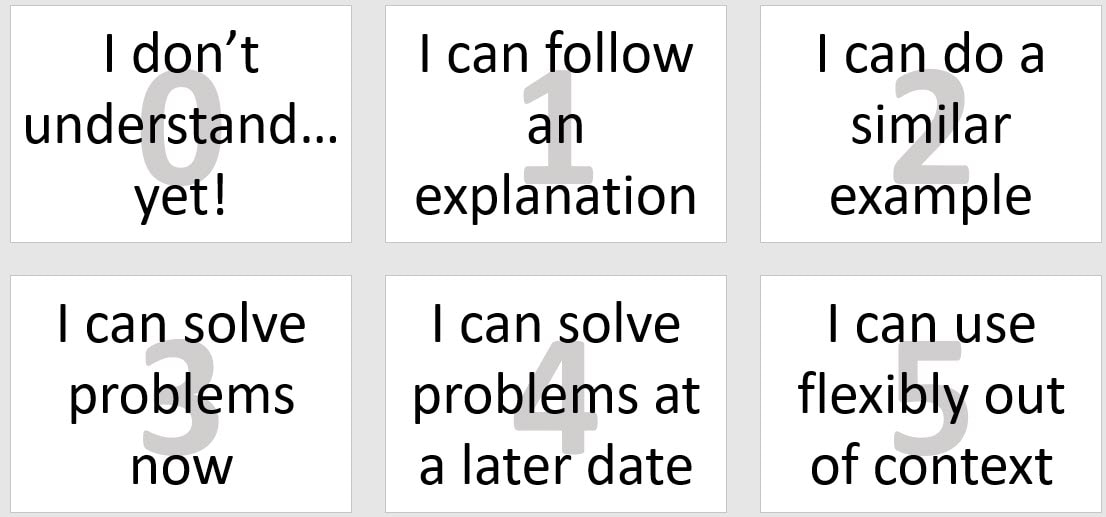The annoying thing is that inflexible knowledge is a necessary step along the path towards flexible knowledge
— RufusWilliam (@RufusWilliam) January 5, 2020
|
There aren't many teachers (or indeed people in general) who would argue with the desire for education to lead to students having flexible, transferable knowledge. That is, that kids learn stuff, but are also able to transfer this knowledge into new an unfamiliar situations easily. As an example from my own subject, we want students to be able to spot when to use Pythagoras' Theorem even when it crops up in a question which has nothing to do with triangles (on the surface), or, even better, when it appears in a different subject (surely the true Holy Grail). All subjects have ideas like this (perhaps this is what we mean by concepts?) that we want students to be able to recognise outside of the narrow confines of the lesson or topic. It is worthwhile spending a few minutes thinking about some of these in your subject.
But as teachers we also know that this is surprisingly difficult to achieve, and are often astounded that students just can't see it when this concept appears somewhere new, especially when we know they can do it.
Throughout 2019 I worked alongside two teachers in my department on Checking for Understanding, but early on we diverted to thinking more about what we meant by understanding. Without going into too much detail, we settled on 6 stages of understanding, as shown below in a display I now have in my room.
This made me think about the excellent Daniel Willingham article for the AFT titled "Inflexible Knowledge: The First Step to Expertise", and how Willingham distinguishes between rote, inflexible and flexible knowledge. I would say that our stages 1-4 of our model above are a break down of inflexible knowledge (although 1 could be rote in certain contexts), and that only 5 is true flexible knowledge.
But anyway, the point of this blog was not to delve into the details of the differences between these types of knowledge (read the article above if you want that), but rather to get a bit meta on the idea that inflexible knowledge comes before flexible knowledge can fully develop, which stemmed from this tweet:
If we take the idea that we need to pass through inflexible knowledge to get to flexible knowledge (which is not universally accepted), then this has implications on the understanding of that very statement for teachers.
For teachers to be able to think flexibly about the idea that students need to pass through inflexible knowledge to get to flexible knowledge, the teachers must first pass through an inflexible knowledge of this very idea.
That is, it is completely natural for teachers to know that students need to first develop inflexible knowledge before being able to reach the heights of flexible knowledge, but for those teachers to be unable to apply this to their teaching (which would be showing a flexible knowledge).
If a teacher has passed on to flexible knowledge of the idea that inflexible knowledge is a precursor to flexible knowledge, then they will plan activities to make use of this. Perhaps this would involve using retrieval practice (with higher order questions as suggested here) or something else (this would depend on the individual teachers flexible knowledge of other areas of pedagogy). Once you start to dig a little deeper into this idea, it becomes clear that pretty much everything a teacher does is also subject to this principle. First we learn some new idea, perhaps we play around with it a little, we read more about it, and gradually, as we develop more experience we are able to incorporate it into our teaching practice flexibly.
And that includes our understanding of developing flexible knowledge. This understanding needs to pass through being inflexible before we can flexibly use it.
Thinking about that makes my head hurt, but I think it has implications for teacher professional development. It also make me feel a bit better about knowing I should be doing some things in the classroom, but not being able to do it flexibly.
2 Comments
This time last year I wrote a post on the Successes and Targets I had, and as the new year starts I find myself once again reflecting on last year. My highlights/successes for 2019 have been:
What about my targets from last year?
And looking forward to 2020, I have decided to follow the advice I got from the coaching course, which was to work on one target at a time. So these targets are what I shall work on in my teaching ine the respective bimester. I detailed some things I wanted to work on after reading Making Every Maths Lesson Count.
On top of targets for my teaching, I have some targets for my role as T&L Coordinator.
So there it is. Some highlight from 2019, progress against my targets from last year, and some targets for 2020.
|
Dan Rodriguez-Clark
I am a maths teacher looking to share good ideas for use in the classroom, with a current interest in integrating educational research into my practice. Categories
All
Archives
August 2021
|

 RSS Feed
RSS Feed
